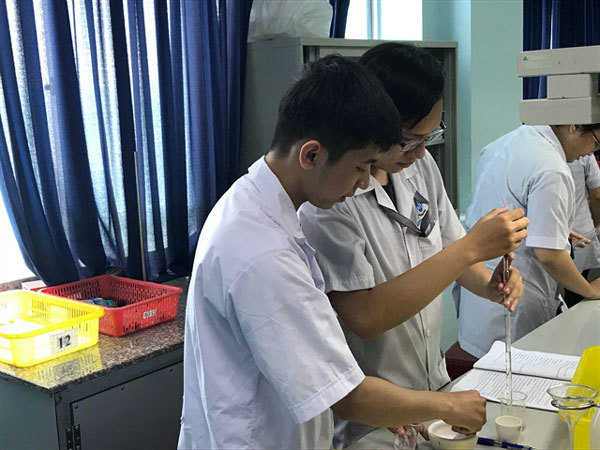Vietnam’s private universities steadily improving
More universities granted Cambridge Int’l Level A qualification
Private higher education institutions face hurdles
 |
| Students at Nguyen Tat Thanh University in HCM City. VNS Photo Gia Loc |
Speaking at a conference on private universities’ existing problems, policies needing to be amended and co-operation chances held in HCM City on August 23, Prof Dr Tran Trung, vice rector of Hanoi’s Hoa Binh University, said private universities should co-operate with each other to improve their quality.
“There is currently no co-operation between universities, whether private or public. They, for instance, could co-operate in training programmes.”
They should define their strengths and weaknesses and identify where to co-operate with each other, he added.
Dr Truong Quang Mui, president of the board of directors of Sai Gon Technology University, said: “Co-operation is vital in current times to help develop a high-quality system of private universities. They should co-operate for a win-win situation.”
They could co-operate to help transfer their students between each other, he said.
Dr Phan Ngoc Son, rector of the Dong Nai Technology University, told Việt Nam News: “Universities share their good professors with each other, meaning professors of one university are able to teach at another. It is wasteful for them to teach at only one university. A common target of the co-operation is to train students to meet enterprises’ requirements after graduating.”
Many universities have tied up with counterparts in other countries to exchange training programmes and lecturers while there is no such co-operation within the country, according to Son.
Online teaching makes such co-operation more convenient.
Hoang Van Cuong, director of the International Student Exchange Centre at FPT University, said universities, including private ones, should co-operate with those in other countries for student exchanges like his university.
The number of international students coming to the university had increased to 819 this year from 460 in 2016, he said.
"Public universities have strength in basic sciences and research and so they should focus on enrolment to these streams," they said.
They also called for enacting a law regulating private universities.
According to Assoc Prof Dr Tran Quang Quy, vice chairman of the Association of Viet Nam Universities and Colleges, 30 years after the first private university opened the country now has 60 of them, or a quarter of the country’s total number.
They have trained nearly 300,000 students, accounting for 15.7 per cent of the total number.
The rate is expected to increase to 40 per cent by 2020.
VNS
 The Association of Vietnam Universities and Colleges should become a link to connect private universities with each other and with public universities to help improve training quality, according to private universities.
The Association of Vietnam Universities and Colleges should become a link to connect private universities with each other and with public universities to help improve training quality, according to private universities.